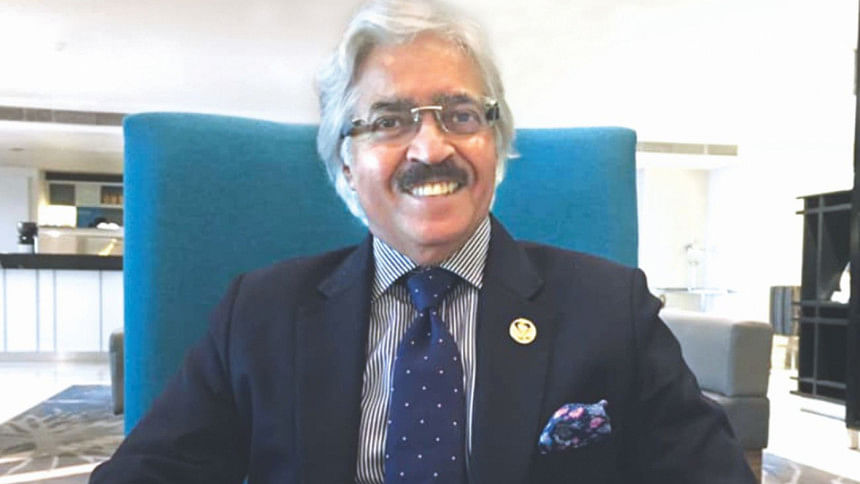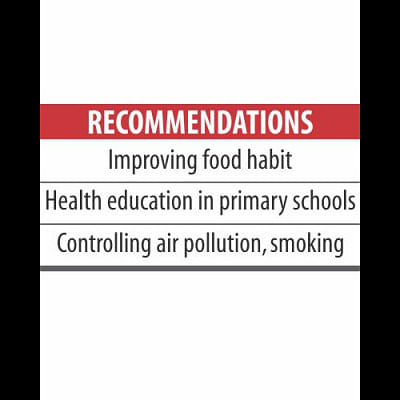'For heart disease, prevention must be the mainstay'

World-renowned cardiologist Dr Ashok Seth has suggested that Bangladesh take up effective steps to control heart diseases, which may get worse in the coming days.
As measures, he recommends improving food habit, regular exercise, health education in primary schools, and controlling air pollution and smoking.
“If the cost of healthcare is to be contained, prevention is going to be the most important in Bangladesh. It remains the mainstay,” said Prof Dr Ashok Seth, chairman of Fortis Escorts Heart Institute in Delhi and head of the Cardiology Council of Fortis Group of Hospitals.
The Indian interventional cardiologist is widely recognised for his pioneering role in development of numerous angioplasty techniques. Angioplasty is a procedure to restore blood flow through the artery.
He has performed over 50,000 angiograms and 25,000 angioplasties and has been mentioned in the Limca Book of Records (an annual reference book published in India documenting human and natural world records). He is the recipient of Padma Bhushan and Padma Shri and BC Roy National Award for his contribution to medical science.

Dr Seth, who has been training Bangladeshi cardiologists over the last 25 years, is also one of those involved in the first-ever human trial of conducting Transcatheter Aortic Valve Replacement (TAVR) in 2004, an advanced technology of cardiac treatment without surgery.
He was in Dhaka to speak on the latest methods of cardiac treatment and cardiac education in an international conference on April 12-13.
Bangladesh has extensive coronary artery diseases, affecting even many of the youth, the cardiologist said. “[Their] blockages are longer, more diffused, involving every artery even with minimal risk factors. That worries me,” he told The Daily Star in an exclusive interview at a city hotel.
Average age of patients undergoing angioplasty in India is 58-59, but in Bangladesh heart disease patients under the age of 40 constitute nearly 20 percent, which is greater than India, Dr Seth said, emphasising more scientific data on Bangladesh because here he sees “a different disease process”.
According to World Health Organization, in 2014, cardiovascular patients accounted for 17 percent of total deaths in Bangladesh whereas nearly three decades earlier all non-communicable diseases together, including heart diseases, had been responsible for only eight percent of total mortality here. There is no recent data on it.
“It's probably the food. A lot of the food here is meat, gravy and oil. I hardly find vegetables here. Also, smoking is heavy here,” Dr Seth said. “The level of air pollution here is quite high.”
“We need to emphasise more that pollution is an important causative factor for heart diseases and heart attack. We must alert the government agencies to take strict measures to control pollution as it not only causes asthma but also heart diseases.”
Delhi has had “odd-even” traffic regulations to control air pollution when it rises beyond a particular level, especially in winter. Bangladesh needs to take effective steps to lower pollution and tobacco consumption, involving the ministries of health and environment, he said.
Dr Ashok emphasised educating children on healthy living. “Schools teach ethics, moral values but why not good health?” he said.
He said over the years Bangladesh has developed a good number of quality cardiologists, who are motivated and inspired. However, they need more support to grow and learn better techniques. They also need exposure to advanced techniques and international experts.
One of the latest methods is TAVR (Transcatheter Aortic Valve Replacement), which he introduced into India. Cardiologists insert a valve through a patient's groin and thread it all the way to the heart, maneuvering it into the site of the old and failing valve. Over a decade back, it was applicable mostly for old and sick patients as they might not survive open-heart surgery.
Recent clinical trials show that TAVR is as useful in patients with low risks too, according to Dr Seth. It is an entirely non-surgical method of replacing heart valve .
“Patients can go home in two days' time just like an angioplasty patient,” he said, adding that patients from Bangladesh and Middle Eastern countries are coming to him for TAVR.
One of the most important topics for discussion in the conference was TAVR.
It takes at least more than two months for a patient to recover if one undergoes an open heart surgery. But TAVR takes only a few days and the patient can walk the very next day. Often, it does not require general anesthesia, Dr Seth said.
“TAVR is not even surgery. We just do it under conscious sedation,” he said, adding that eventually, open heart surgery for replacement of aortic valve in elderly would become outdated.
Convenience and safety wise, TAVR is much better, he said. “The only drawback at the moment is that it's expensive as the valve is imported from the USA. The US-made valve costs $30,000.”
However, India has already developed a valve of which Dr Seth has been a principal investigator that is at half the price of the US one.
He encouraged Bangladesh to develop this therapy in a systematic manner so that Bangladeshis also have access to the therapy at home.
Dr Seth's dream is that all advanced therapies should be available to Bangladeshis at an affordable cost, so that patients do not go overseas for treatment. That is what he did for India and that is what he will continue to help Bangladesh cardiology to achieve.
While advanced treatment is important, “prevention must be the mainstay”, he emphasised.

 For all latest news, follow The Daily Star's Google News channel.
For all latest news, follow The Daily Star's Google News channel. 



Comments